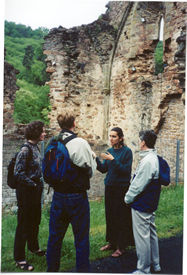Aubazine
Johnny Jones, May 2000
I left you last week in Arles, which was Roman ruined and presently yucky, with the doggies and all. From there we went to see Amy's best friend, Rachel, in Aubuzine.
Aubazine is sort of like Viburnum - small, isolated and remote. Unlike Viburnum, it is historic; the monastery where Rachel lives in the Catholic Community is a thousand years old.
About fourteen years ago the monks abandoned Aubuzine, founded by St. Etienne, because there were too few of them to care for it, and the bishop was looking for someone to take it over. A couple from the small town had a vision of forming a community for evangelism and discipleship, a community that would include married as well as single, people with a short-term as well as a long-term commitment.
We only had time to look around at the grounds before dinner. The first thing I noticed was that everything was made of stone.
At dinner, it was evident the community didn't have money to spare; the soup was made of vegetables donated by the locals, and the bread was a little old. I suspect the veggies were, too, but, in typical French style, the soup was delicious. Everything was simple, but healthful, nutritious and tasty. Except the bread, which French people consider vital; Rachel said it was "very bad."

When we came in to the dining room, we were given small paper napkins, one each. Members of the community had cloth napkins, which they reused. No one said anything about conserving; it's just that everyone ate every last bit of soup in the bowl. You wouldn't have needed to scrape the dishes for the dishwasher, had there been one. In my mother's Depression-era upbringing, I learned not to waste food - but in Aubazine, even leaving a pea on a plate was profligate.
The rhythm of the Community was not by the clock, but by bells. The bells woke up the next morning, giving us time to dress before morning worship. We didn't have to go, but we wouldn't have missed it: The sun streaming in shafts through the windows, reflected off the curved stone ceilings ó the prayers of worship and humility ó the sound of the singing, either a capella or accompanied only by a flute or guitar ó it felt like a taste of heaven. We learned later that the songs were either Gregorian chant, or were newly composed by members of the community who contributed them anonymously. Even without understanding a word, we drank in the spirit: Simplicity, humility, harmony, purity.
Breakfast was the same as everywhere else we traveled in France: Strong coffee and hot milk, and baguettes with jelly. The difference was that the community shared it in silence.
After breakfast the community's head allowed Rachel to accompany us instead of completing her work for the day. Rachel knew we loved to hike, so she took us along the path beside the Monk's Canal. The canal was a wonder: Since there was no water where the monastery was constructed, the monks brought it down from a river in the nearby hills a thousand years ago. That canal is still the water source, and the water pressure was better than most places we traveled. But besides the still-solid stone walls of the narrow canal, the scenery was idyllic: Wooded, gently-sloped hills beside the tumbling stream, and meadows with sheep near helmeted houses. It looked like a poem.
At dinner that night a community member, an ex-attorney, sat beside me and translated (she had been an exchange student in the USA). The prayers touched me; they were the opposite of self-centered: Thank you, Lord, for the joy that comes with our faith; Lord, we bless you and ask your for unity among believers; Thank you for the grace that you give us.
And the community members loved us and prayed for us and provided for us, not just meals, but three sun-lit bedrooms full of furnishings that had been there for who knows how long. Even the keys in the doors were older than I have ever seen. And the wide stone stairs were worn on the ends from a thousand years of walking on.
We left Aubazine wishing we had more time to drink in the loveliness of God's spirit and grace there. It was a place where hurry and worry stopped, a place of joy and peace. We felt the Lord had refreshed and provided for us. The entire place and the people, with their faces full of the Lord, glorified Him.
